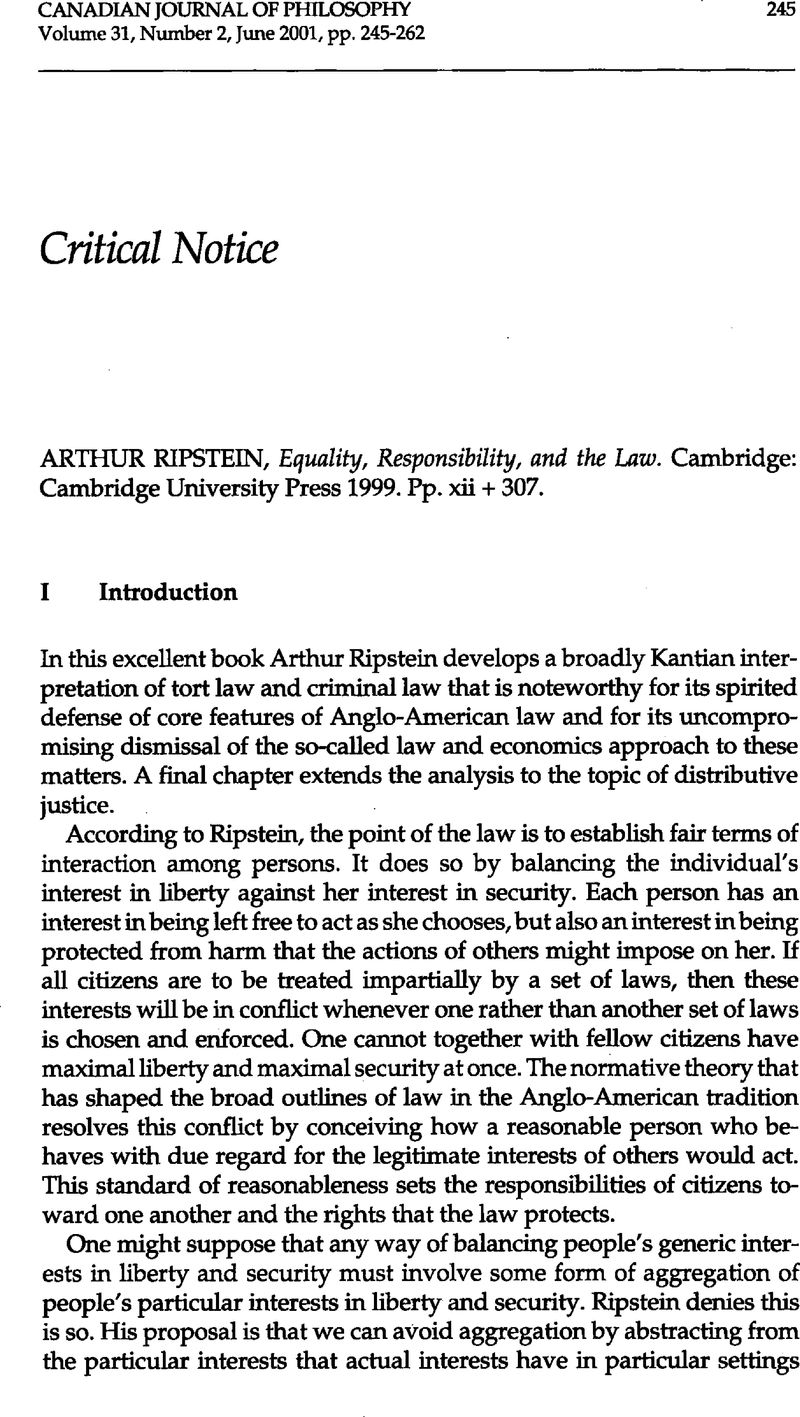No CrossRef data available.
Published online by Cambridge University Press: 01 January 2020

1 See, for example, Coleman, Jules Risks and Wrongs (Cambridge: Cambridge University Press 1992)Google Scholar; Weinrib, Ernest The Idea of Private Law (Cambridge: Harvard University Press 1995)Google Scholar; and Stephen, Perry ‘The Moral Foundations of Tort Law,’ Iowa Law Review 77 (1992) 449–513Google Scholar.
2 Kaldor-Hicks can give inconsistent guidance in some circumstances (urging that a change from the status quo would be an improvement and also that if it were made, a change to the status quo ante would be an improvement). So it could not be an across-the-board test of ethically desirable change. Ronald Dworkin criticizes Kaldor-Hicks, in ‘Is Wealth a Value?’ in his A Matter of Principle (Cambridge: Harvard University Press 1985)Google Scholar. Posner, Richard A. defends Kaldor-Hicks as a normative standard in The Problems of Jurisprudence (Cambridge, MA: Harvard University Press 1990), chapters 12-13Google Scholar. He somewhat retracts this claim in ‘Wealth Maximization and Tort Law: A Philosophical Inquiry,’ in Philosophical Foundations of Tort Law, Owen, David G. ed. (Oxford: Clarendon Press 1995).Google Scholar
3 Ripstein cautions against taking the risk ownership metaphor too literally. Having behaved negligently, I do not really have property rights in the risk I create. But notice that in a sense I may ‘sell’ this risk by purchasing accident liability insurance. The legal judgment that imposes tort liability on a person is not a determination that the person must be made to suffer by paying the full amount of the judgment herself. She may ensure in advance by insurance contract that others will pay the money that discharges the liability obligation. The availability of accident insurance might be thought to mitigate the concern that prompts the risk pooling proposal. Ripstein does not rely on this response, but contends that tort law practice would be fair even if insurance against the risk of being found tortious could not be purchased for some reason.
4 However, one can raise Ripsteinesque questions. Suppose two persons are both driving unsafely for the same reason: each wants to place a bet at the track. Both drive with excessive speed and arrive on time to place their bets. One person's negligent driving causes an accident Gust as the speeding car arrives at the race track entrance). One person wins her bet. The risk pooling proposal says each of the agents ideally ought to pay the same towards a compensation fund, because the conduct of each imposed the same wrongful risk. But why not require the person who wins her bet to contribute some of the winnings toward the compensation fund? The risk pooling proposal singles out a slice of the chance events that befall those who are negligent and corrects the slice so that each pays proportionally to fault. But why this particular slice?
5 See Hart, H.L.A. ‘Intention and Punishment,’ in his Punishment and Responsibility (Oxford: Oxford University Press 1968)Google Scholar. A recent exploration of the issue is in Lewis, David ‘The Punishment that Leaves Something to Chance,’ Philosophy and Public Affairs 18 (1989) 53–68.Google Scholar
6 Frankfurt, Hirry G. ‘Equality as a Moral Ideal,’ in Frankfurt, The Importance of What We Care About: Philosophical Essays (Cambridge: Cambridge University Press 1988)CrossRefGoogle Scholar. It should be noted that Frankfurt's understanding of what is ‘sufficient’ differs from the view I discuss in the text. Nussbaum, Martha proposes another version of sufficientarianism in several essays including ‘Aristotelian Social Democracy,’ in Liberalism and the Good, Douglass, R.B. eta!., eds. (New York: Routledge 1990)Google Scholar; also Nussbaum, Martha ‘Human Functioning and Social Justice: In Defense of Aristotelian Essentialism,’ Political Theory 20 (1992) 202-46CrossRefGoogle Scholar. I borrow the term ‘sufficientarianism’ from John E. Roemer.
7 On primary social goods, see Rawls, John A Theory of Justice (Cambridge: Harvard University Press, 1999), 78–81Google Scholar; also Rawls, John ‘Social Unity and Primary Goods,’ reprinted in Rawls, John Collected Papers, Freeman, Samuel ed. (Cambridge: Harvard University Press 1999)Google Scholar.